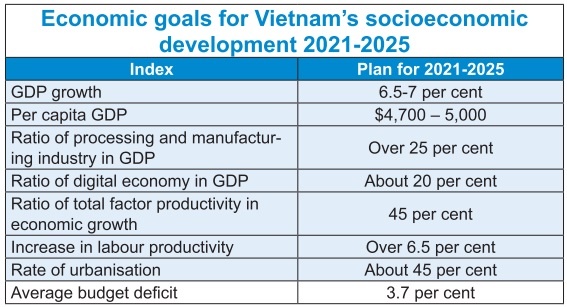Innovation name of the game in Vietnam’s digital ambitions
 |
| Innovation name of the game in Vietnam’s digital ambitions. Photo: Shutterstock |
The government is highlighting technology and innovation more than ever before in the 2021-2026 action programme on implementing the National Assembly’s Resolution on 2021-2025 Socioeconomic Development Plan. The action programme is featured in Resolution No.99/NQ-CP, which was released on August 30.
Under the plan, Vietnam aims to become a developing country with modern industry by 2025, surpassing the low-middle income level. The plan identifies 23 targets, one of which is average annual GDP growth of 6.5-7 per cent within the five years (see box).
 |
| Four main advantages to the digital economy - More information, more choices, more sales, and more consumer satisfaction. The increased availability of data can help inform businesses about what is happening in the economy and what new trends in consumption are developing and help them reach new buyers. At the same time, the internet has enabled consumers to have greater information and choice. This increased flow of information allows firms to respond more quickly to changes in consumer tastes. It also allows them to personalise their offers to individual customers, including through 3D printing and other technologies. - Saves time. In many countries, millions of products can be ordered over the internet and shipped the same day, allowing customers to skip a visit to the store. This helps businesses be more prompt in service and product delivery and saves consumers time they can dedicate to other pursuits. - Reduced costs, increased competition, and new products and services. A digital economy enables firms to reduce the brick-and-mortar costs of retail outlets by shipping goods directly from the factory or warehouse. This lowers overhead and labour costs and by extension prices. The digital economy also enables work from home and flexibility in working hours, which can benefit employees with childcare costs or other responsibilities. In some markets, aspects of the digital economy make it easier for new firms to enter. If an entrepreneur has an innovative idea or product, they can pursue crowdfunding or market directly to consumers, overcoming many traditional barriers to entry. - More data also help the government better understand what is happening in the economy and what services it can or needs to deliver to various subgroups of citizens. The explosion of e-government services helps reduce bureaucratic delays, improve the quality of services to clients, and reduce corruption. Source: World Bank |
One of the key drivers of the economy to reach such a growth target is attraction and application in all sectors of digital technology and innovation, especially amid the ongoing health crisis which has significantly changed the way the Vietnamese economy is operating.
The government will “build, pilot, and perfect policies and legal frameworks for the development of digital infrastructure, digital industries, and digital-related business and product models,” stated Resolution 99. “There will be synchronised laws on startups and innovation, intellectual property rights, commerce, investment, and business to facilitate the national digital transformation and development of new products, services, and business models with the application of high technology, sharing economy models, and digital transactions in assets and venture capital.”
As an ASEAN member with robust economic growth, Vietnam has a network of 17 free trade agreements with over 60 partners, a domestic market of around 100 million people, the majority made up of young people, and an innovation-driven mindset that is highly responsive to digital technologies.
“Taken all together, Vietnam has vast untapped potential in developing its digital economy. Currently, nearly 70 per cent of Vietnamese people are internet users, and Vietnam is among the fastest-growing countries in terms of digital evolution momentum,” said Prime Minister Pham Minh Chinh.
| Pham Minh Chinh - Prime Minister
We should harness the opportunities presented by the fight against COVID-19 to kickstart focus on digital technology and digital economy, in order to soon realise the UN 2030 Sustainable Development Goals. Vietnam looks forward to the active and effective cooperation of the international community to ensure that digitalisation is truly a new method for narrowing not only the development gap among countries but also social inequalities. Such cooperation will also help ensure that people living in underdeveloped or remote areas can enjoy equal access to digital services. It is necessary to uphold the role of international agreements on digital tech and the digital economy. They would drive the development of these areas, while safeguarding the legitimate demands of countries in ensuring cybersecurity and safety, and personal privacy, preventing monopoly and eliminating inequality in tax obligations. In this spirit, Vietnam has participated in shaping new norms pertaining to e-commerce in free trade agreements, the most recent ones being the Regional Comprehensive Economic Partnership and the ASEAN-China Free Trade Area. It is essential to strengthen cooperation in the education and training of human resources as well as bolster connectivity among the scientific and technological communities between different regions. This would serve to improve digital literacy for our businesses and support workers, particularly those from disadvantaged groups, in gradually adapting to digital technology. Furthermore, we need to promote digital technology in facilitating trade, supporting the flow of goods and services, especially via multimodal transportation and the movement of people. This would prevent the disruption of the supply chains, particularly as the COVID-19 pandemic may persist. Finally, we should cooperate to enhance cross-border digital trade in a fair and mutually beneficial manner, thereby promoting exports, especially those of seasonal agricultural and aquacultural goods. |
Under the new 10-year Socioeconomic Development Strategy for 2021-2020 as pointed out by the Political Report – the most important document adopted at the 13th National Party Congress – Vietnam will “continue strengthening the renewal of economic growth model, strongly shifting the economy to a new growth model based on a rise in productivity, advanced science and technology, innovation, high-quality human resources, and effective usage of all resources in order to raise the quality, effectiveness, and competitiveness of the economy.”
Vietnam will also “prioritise attraction of foreign-invested projects with high technology and environmentally-friendly nature, and usage of skilled labourers and projects investing in the fields needing to be prioritised for development. The projects, moreover, are also required to have a connection and technology transfer with domestic enterprises and facilitate these enterprises to develop and effectively engage in the global value chains.”
All of these will “lay new momentum for national rapid and sustainable development,” stated the Political Report.
Many sectors will see prioritised digital development such as tourism, commerce, telecommunications, IT, transport, logistics, technical services, legal consultancy, finance and banking, insurance, healthcare, education and training, science and technology, culture, and sport.
As countries seize the opportunity to reap the dividends of digital transformation, the government has clearly indicated it wants to be in the race. The prime minister expects Vietnam to join the 50 leading countries in IT development as soon as 2025. He has also indicated that the digital economy should reach one-third of the country’s GDP by the end of the decade, from 5 per cent today.
According to the World Bank, Vietnam can gain substantially through the digital transformation of its economy. The country has a head start in access to mobile phones, and an increasing share of the population is connecting to the internet. The country also hosts several of the world’s leading IT companies such as Apple, Samsung, and Intel.
“But becoming a digital powerhouse will require more than good connections and foreign investors. To ensure a successful digital transformation, policymakers need to increase trade competitiveness in manufacturing by embracing digitalisation, encourage technology adoption, and attract investment to enable small business participation in the digital economy, all while achieving skills acquisition and upgrading, data privacy, and cybersecurity,” the World Bank suggested.
Last October, Party General Secretary and President Nguyen Phu Trong signed Resolution No.52-NQ/TW on a number of guidelines and policies to actively participate in Industry 4.0. “Active participation in Industry 4.0 is the inevitably objective requirement of special significance for Vietnam to achieve breakthroughs in socio-economic development,” the resolution noted.
Under the resolution, Vietnam has set a goal to increase the GDP share of the digital economy to 20 per cent by 2025, and 30 per cent GDP by 2030 when all people can access the 5G service. The country expects to become one of the leading hubs for startups and innovation in Asia by 2045. It also aims to increase the broadband internet coverage rate to 100 per cent (accessible by all communes) and labour productivity by 7 per cent annually from now to 2025.
What the stars mean:
★ Poor ★ ★ Promising ★★★ Good ★★★★ Very good ★★★★★ Exceptional
Related Contents
Latest News
More News
- Vietnamese businesses diversify amid global trade shifts (February 03, 2026 | 17:18)
- Consumer finance sector posts sharp profit growth (February 03, 2026 | 13:05)
- Vietnam and US to launch sixth trade negotiation round (January 30, 2026 | 15:19)
- NAB Innovation Centre underscores Vietnam’s appeal for tech investment (January 30, 2026 | 11:16)
- Vietnam moves towards market-based fuel management with E10 rollout (January 30, 2026 | 11:10)
- Vietnam startup funding enters a period of capital reset (January 30, 2026 | 11:06)
- Vietnam strengthens public debt management with World Bank and IMF (January 30, 2026 | 11:00)
- PM inspects APEC 2027 project progress in An Giang province (January 29, 2026 | 09:00)
- Vietnam among the world’s top 15 trading nations (January 28, 2026 | 17:12)
- Vietnam accelerates preparations for arbitration centre linked to new financial hub (January 28, 2026 | 17:09)


 Tag:
Tag:



















 Mobile Version
Mobile Version